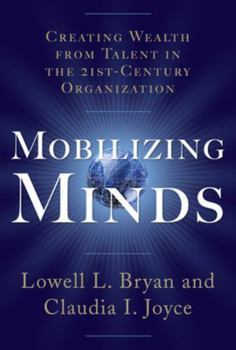Mobilizing Minds: Creating Wealth from Talent in the 21st Century Organization
Based on a decade of exclusive research, Lowell Bryan and Claudia Joyce of McKinsey & Company have come up with a simple yet revolutionary conclusion: Your workforce is the key to growth in the 21st century. By tapping into their underutilized talents, knowledge, and skills you can earn tens of thousands of additional dollars per employee, and manage the interdepartmental complexities and barriers that prevent real achievements and profits.
This can only be accomplished through organizational design and redesign. That's the new model for survival in the modern, digital, global economy. With the right design, your organization will have the capabilities to pursue whatever strategy is necessary to compete on any scale, react to any market change, leverage any opportunity, and sail past the competition.
In Mobilizing Minds, the authors distill their research into seven strategic ideas that shatter the complexity frontiers, have the potential to unleash enormous profits, and enable long-term success for every company. Bryan and Joyce outline innovative principles that enable corporations to:
Manage complexity, bureaucracy, and redundancyUse hierarchical authority to strengthen the authority of key managers and drive performanceDeliver operating earnings while implementing wealth-creation strategiesAllow formal networks, talent, and knowledge marketplaces to work in a large companyMotivate and reward wealth-creating behaviorPursue organizational design as a corporate strategyIncrease worker satisfactionIt is imperative for corporations to put the same energy used for new products and processes into organizational design. That's where the money is. That's where the opportunities lie. That's the key to surviving and prospering in the 21st century.
Related Subjects
Business Business & Finance Business & Investing Economics Management Management & Leadership




